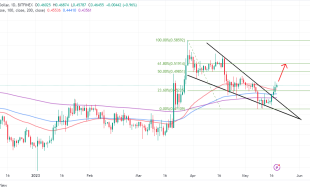Join Our Telegram channel to stay up to date on breaking news coverage
Lebanon is facing one of the worst degrees of economic turmoil after the country’s inflation rate hit a staggering 264% at the start of the second quarter of 2023. This record plunge in the value of the local currency has pushed citizens to seek out digital assets to make ends meet.
The country’s economic meltdown has been brewing for several years. Since August 2019, the Lebanese Lira has lost more than 95% of its value. This situation is the result of several poorly compounded economic decisions.
JUST IN‼️: 🇱🇧Lebanon’s annual inflation rate reached 264%, up from 190% in February.
Lebanon needs #Bitcoin
— Crypto Panda (@TheCryptoPanda_) May 19, 2023
However, the government’s move to close down all residential financial firms indefinitely is the leading cause of the economic move from Lebanon’s fiat currency to cryptocurrency among the country’s residents.
Since the financial institution ban took effect in September 2022, it has become increasingly difficult for Lebanon’s residents to earn a living. This ban made it near impossible for citizens to withdraw money from financial institutions, and even when they could, they made significant losses in the process.
Consequently, the price of commodities more than skyrocketed, while the average minimum nose-dived from $450 to $17 a month. Currently, $1 is equivalent to about 15,000 Lebanese Lira, and 10,000 Lira is only enough to buy about 2.2 lbs. of tomatoes and 2.2 lbs. of oranges.
“Food items today cost about ten times more, compared with 2019. The price of an ounce of milk increased by seven times, from 3,000 lira in March 2019 to 22,000 lira in July 2021. The price of 50.7 ounces of cooking oil rose 37 times from 2,000 lira to 73,750 lira.
Basic clothing, such as a non-branded T-shirt, increased nearly fourteen-fold. from 6,500 lira to 90,000 lira. Other staples, such as bread, increased for the first time in 10 years despite government subsidies for flour.”
Crypto Is the Future
Cryptocurrencies have become the most effective solution for the rising costs of living in Lebanon. Crypto-savvy Lebanese are now opting to mine Bitcoin and acquire other digital assets to meet their daily needs. Lebanon’s residents are now seeking online jobs that pay them in cryptocurrencies like Bitcoin. Others are actively mining Bitcoin and trading other cryptocurrencies like Tether (USDT) to get enough to purchase groceries.
Unfortunately, some of these processes may be too expensive to set up or be dangerous. Bitcoin mining, for instance, may require high initial capital for mining rigs. Even with cloud mining options, the initial investment cost may be beyond most people’s capabilities.
When it comes to trading crypto, some Lebanese residents prefer shortcut methods due to the urgency of their financial situations. As a result, they end up setting up clandestine online meetings and going for quick black market solutions that allow them to trade dollars for crypto, a situation that can result in negative outcomes like scamming.
Digital Asset-Based Financial Systems Can Help Stabilize Struggling Economies
Lebanon’s over-heightened inflation rate has led many to believe in the power of digital currencies. Although crypto has online security concerns, it is decentralized. This characteristic frees the assets from corruption and manipulation by governments, independent entities, and individuals.
Additionally, crypto’s self-regulating tokenomics are capable of mitigating inflation. This is attainable by creating a token that has hard supply limits. Limiting the supply of an asset ensures it increases in value over time, securing it from inflation.
This places crypto in a unique position as many countries continue to experience economic distress. Although these online assets are not an instant solution, they have a lot of potential. Countries that will consider incorporating them into their financial systems may manage to escape financial ruin.
More News
- Small Victory for SVB Financial as Judge Orders FDIC to Return Tax Refund Checks
- Is It The End For Terra Luna Classic Or Will The Development Boost Its Value
- Crypto Broker Voyager To Pay Creditors $1.3B After Bankruptcy
Join Our Telegram channel to stay up to date on breaking news coverage


